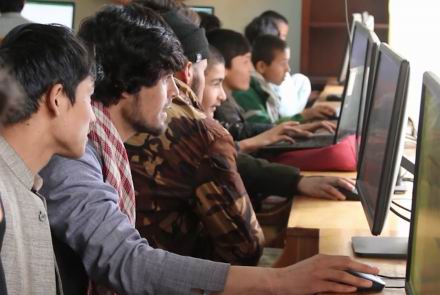The department of information and culture of Badakhshan, Afghanistan Northeastern province has told the media that the provincial government has managed to provide free education for nearly 500 students in the province. According to the details, male students who could not afford educational expenses in private educational centers are being provided free of cost education in IT, the English language, calligraphy, and religion. Initially, the program has been started for six months which is likely to continue and expanded to the majority of the population in the future.
The Taliban-ruled Afghanistan is passing through very dire situations amid global restrictions against the Taliban regime, coupled with the global energy crisis, inflation, and worst humanitarian conditions in most parts of the country. The Afghan nation is embattled with multiple issues ranging from law and order problem to a lack of essential needs for living including jobs, health, and education facilities, and the absence of fundamental rights and civil liberties. However, the health and education sectors are completely dysfunctional because of the availability of essential infrastructure, funds, trained staff, or technical expertise in war-hit regions. At the helm of all those administrative and financial issues, the recent gender-based actions and ban on girls’ education proved to be another setback for the already malfunctioned education sector in Afghanistan.
Historically, Pakistan has played an important role in the promotion of education in its neighboring country while half a million Afghan refugee students are studying in Pakistani educational institutions, and benefit from Prime Minister Scholarship program for Afghan students active since 2009. Thousands of Afghan students are studying in Pakistani educational institutions under Allama Iqbal Scholarship Program and Hanns Seidel Scholarship programs. Other than government-funded educational programs, Pakistani teachers, Philanthropists, and charity organizations had played an important role in the provision of religious and modern-day education to their Afghan brethren by establishing schools, and seminaries in various parts of Afghanistan. Pakistan not only assisted the Afghan people through the provision of all possible help on its own land but also provided substantial financial and technical support to the Afghan government to establish educational facilities inside Afghanistan to help mitigate the needs of Afghans.
In this regard, Liaquat Ali Khan Engineering Faculty, Balkh University, Rehman Baba High School, Sir Syed Science Faculties in Jalalabad and Nangarhar, and Allama Iqbal Arts Faculty University of Kabul are magnificent projects that not only satisfied the needs of Afghan youth but created strong fraternal bonds between the two brotherly nations. Recently, the government of Pakistan has issued Special RFID Cards to Afghan students to facilitate their admission and travel to Pakistani schools in border regions on daily basis for educational purposes.
Currently, the Afghan nation faces multiple issues, however, scrouges of poverty and illiteracy are sharply pushing Afghan youths into the hands of Afghan warlords, terror outfits, and drug traffickers, which is not only causing serious social and security problems for the Afghan government but also increasing the same risks for regional nations. The Afghan authorities have launched an initiative to provide free of cost education to poor youths in their country but the resource-deficient nation needs foreign support for the continuation and expansion of this endeavor. Therefore, regional countries particularly Pakistan’s government, INGOs, and the private sector must support these endeavors to play a constructive role in eradicating poverty and illiteracy in their neighborhood, to realize the collective goal of peace and stability in the region.







